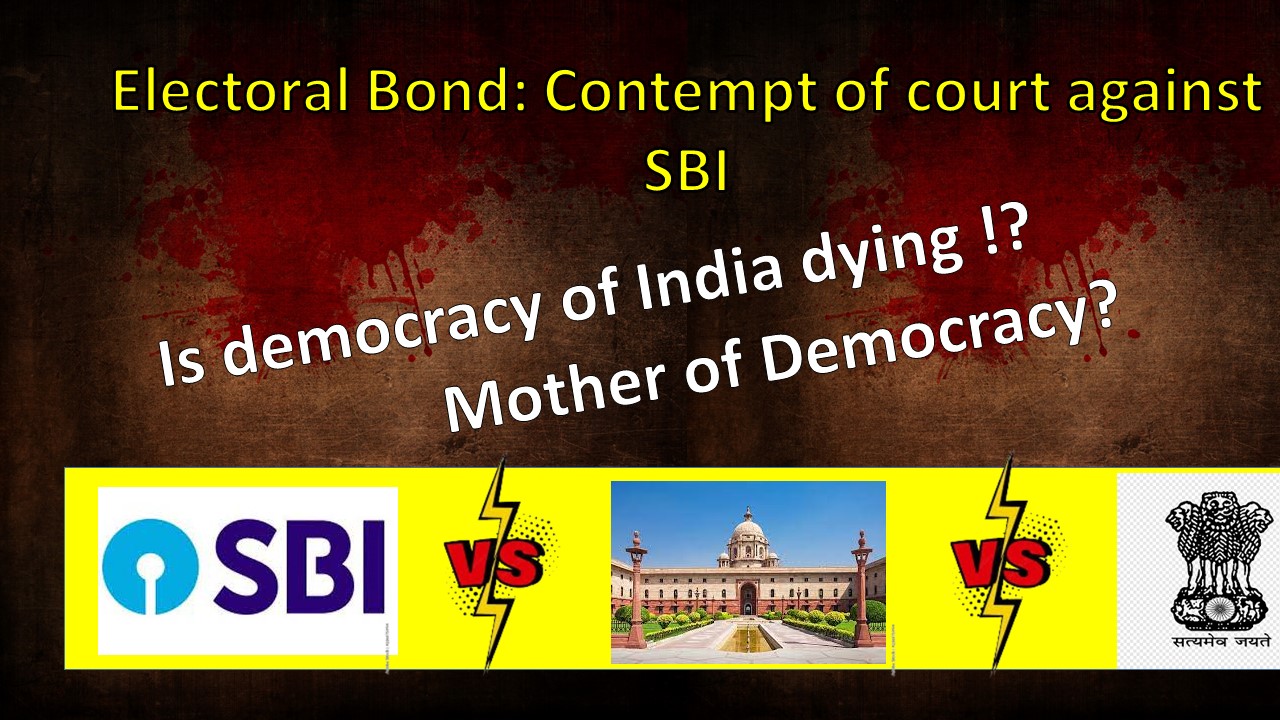Electoral Bond
A Transparent Political Funding Mechanism Introduced by the Indian Government in 2018. Electoral bonds, available for purchase from designated State Bank of India branches, offer individuals and entities fixed denomination options for anonymous donations to eligible political parties.
Learn how electoral bonds promote transparency by providing a traceable paper trail while safeguarding donor anonymity. Explore the debate surrounding electoral bonds, from claims of reducing black money influence to concerns about opacity in political funding. Stay informed about the ongoing discourse and potential reforms regarding this crucial aspect of political finance.
Recent News
79 former civil servants, part of the Constitutional Conduct Group (CCG), have requested the Election Commission of India to instruct the State Bank of India to promptly disclose the information of donors participating in the electoral bonds scheme. This request comes after the Supreme Court declared the scheme as “unconstitutional.”
Read Also: Changes Introduced by Bharatiya Nyaya Sanhita(BNS) 2024
On March 4, the State Bank of India (SBI) requested the court to extend the deadline for compiling donors’ data until June 30, instead of the initial deadline of March 6. The Constitutional Conduct Group (CCG) expressed concern that the SBI’s refusal to provide this information, indicating it wouldn’t be available before the general elections, suggests an attempt to shield the government from criticism. They suggested that this reluctance may imply efforts to hide potential quid pro quo arrangements between electoral bonds and favors granted to certain firms, or actions like raids or intimidation to influence corporate behavior.
Read Also: Literature Corner
CCG OPEN LETTER TO THE ELECTION COMMISSION OF INDIA
Shri Rajiv Kumar
Chief Election Commissioner Shri Arun Goel
Election Commissioner
Dear Shri Rajiv Kumar and Shri Arun Goel,
We are a group of former civil servants of the All India and Central Services who have worked in the Central and State Governments during our careers. As a group, we have no affiliation with any political party but believe in impartiality, neutrality and commitment to the Constitution of India.
We are writing to you with reference to the extraordinary request of the State Bank of India (SBI) to the Supreme Court of India (SCI) to extend the time to submit information regarding electoral bonds till June 30, 2024, by which time the elections to Parliament would be over. We note with dismay that it took SBI seventeen days to inform the Court on 4th March that they are not in a position to collate the data by 6th March. For India’s largest bank with 48 crore accounts and boasting high levels of digitization, a pathetic excuse has been proffered that records were kept manually and hence the extension sought. Thomas Franco, former General Secretary of the All India Banking Officers Confederation, has pointed out that SBI had asked the Government of India by a letter of June 2018 for a sum of more than Rs 60 lakhs for development of IT systems for the electoral bond scheme. In the same piece, Franco has also published an RTI reply that gives, in just a period of six days, details of bonds sold over six years. Subhash Chandra Garg, Finance Secretary at the time of finalization of the scheme (and a defender of it), has said in interviews that it should not take more than ten minutes to get the information sought. He also makes the important point that the SCI has notasked for details linking the purchase of bonds with the political parties to whom they have been given; so, the demand for time is wholly unjustified.
While striking down the scheme of electoral bonds as unconstitutional, the SCI had flagged both the right to information of the citizens of India to know about funding of political parties and how there would be no level playing field if one party got undue financial advantage. The SBI’s denying this information and indicating that it would not be available before the general elections seems to indicate that the SBI is shielding the Government in power from any criticism that there was a quid pro quo between the bonds and favours given to some firms or raids/intimidation to pressurize the corporates to fall in line. The media portals Newslaundry and News Minute have already published material linking thirty corporates and their purchase of bonds worth about Rs 335 crore in the previous five years to the blatant misuse of enforcement agencies to make these corporates fall in line.
We would like to reference the letter of March 6, 2024, written by EAS Sarma, a former Secretary to the Government of India, in which he has requested the ECI not only to freeze any unspent funds of political parties from the scheme but also not to publish the schedule of elections till the SBI gives the information ordered by the SCI. We note that the term of the present Lok Sabha is up to June 16, 2024, and to complete the election in time, the ECI could announce the schedule by March 27, or even earlier. The SBI should give the electoral bonds data much before the announcement of the elections. This is an opportunity for the ECI to reclaim its reputation and its integrity by using its powers under Article 324 of the Constitution. As Shri Sarma has suggested, it should direct the SBI to immediately release the information. The ECI should also make it clear that it will not announce the schedule for the 2024 general elections till the SBI furnishes this information. If the ECI remains quiescent, it will not live up to its Constitutional mandate of respecting the right to information of Indian voters and of holding free and fair elections on a level playing field. That would be a death blow for democracy in India as we know it.
SATYAMEVA JAYATE




